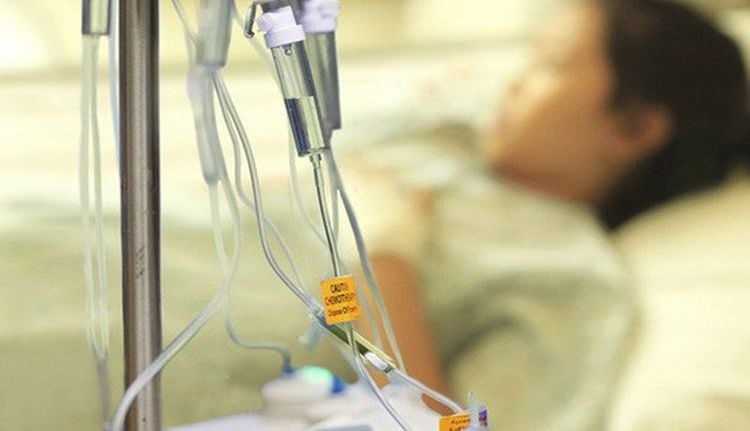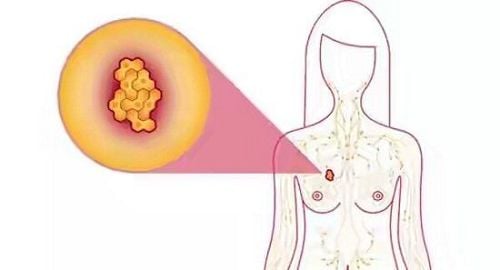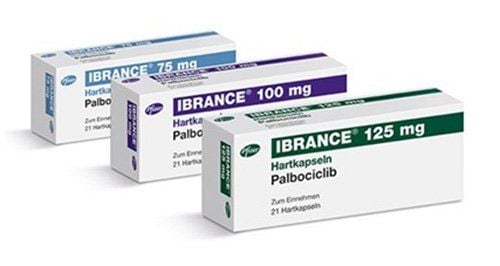This is an automatically translated article.
In about 1 in 5 breast cancers, the cancer cells have an extra copy of the gene that makes the HER2 gene. HER2-positive breast cancers tend to be more aggressive than other breast cancers. Therefore, early detection will help the treatment process to be highly effective.
1. What is HER2-positive breast cancer?
HER2-positive breast cancer is a type of breast cancer in which breast cancer cells have a protein receptor called HER2 (epidermal growth factor receptor 2). Normally, this protein helps breast cells grow, divide, and repair themselves. But sometimes, it's faulty in the gene that controls the HER2 protein and the body makes too many of these receptors. As a result, breast cells grow and divide uncontrollably.
HER2-positive breast cancers tend to be more aggressive than HER2-negative breast cancers. Along with a tumor type and cancer stage, HR and HER2 status help determine the appropriate treatment option for best results.
The cause of HER2-positive breast cancer remains unknown. However, doctors and experts alike think it could be a combination of things including an individual's genes, environment and lifestyle. Children born to parents with the disease who do not inherit bad copies of the HER2 gene will not be passed on by their parents.
The most common symptom of breast cancer is a lump in the breast that feels different from the area around the breast (Presumably HER2 positive). Other signs and symptoms commonly seen in HER2-positive breast cancer include: breast swelling, breast changes in shape, Skin irritation or indentations in the breast, pain in the breast or nipple, redness or thickening of the nipple or breast skin, discharge from the nipple that is not milk.

Ung thư vú dương tính với HER2 gây sưng vú
2. Diagnosis of HER2 .-positive breast cancer
When breast cancer is found, the patient will be checked by the doctor to see if it is HER2 positive. Some of the tests needed for the diagnosis of HER2-positive breast cancer can be used such as:
The IHC test uses certain antibodies to identify HER2 protein in breast cancer tissue samples. The FISH test uses fluorescent DNA fragments that bind to the HER2 gene in cells, which can then be counted under a microscope. The Inform Dual ISH test uses staining of the HER2 gene in a tissue sample so that it can be counted under a microscope. In addition, the doctor will use a number of questions to determine, such as:
Where exactly is the cancer and what stage is it at? Which treatment method is most effective? (requires radiation, chemotherapy or endocrine therapy...) Treatment plan if cancer does not respond to treatment

Để chẩn đoán ung thư vú dương tính với HER2, người bệnh cần thực hiện một số xét nghiệm
3. Treatment of HER2 .-positive breast cancer
Because breast cancer is HER2 positive, the doctor will treat it in a special way. This may involve:
Chemotherapy: This may be used before surgery to shrink a tumor, or after surgery to kill any remaining cancer cells. Because treatment for cancer may have spread or in combination with other drugs. Radiation: This can be given after surgery to reduce the chance that the cancer will come back or if the cancer has spread to other parts of the body. There are two main types of radiation used to treat HER2-positive breast cancer: external beam radiation, which uses a machine to direct radiation to the cancer area, and Brachytherapy, where doctors place a radioactive pellet body for a short time. Surgery: For stage 1 to 3 cancers, surgery is possible. Cystectomy or breast-conserving surgery. The surgeon will remove the tumor and some surrounding tissue. Breast removal surgery. The surgeon will remove the entire breast. The patient may have surgery to check if the cancer has spread to nearby lymph nodes:
Prophylactic lymph node biopsy (SLNB). The surgeon removes only the lymph nodes under the arm to which the cancer is likely to spread first. Axillary lymph node dissection (ALND). The surgeon will remove many nodes (usually less than 20) from under the arm. Surgery may also be the treatment of choice for stage 5 HER2-positive or metastatic breast cancer to prevent or treat symptoms and complications of the disease.
Targeted therapy: Doctors usually start HER2 treatment with special drugs called targeted therapies. They work by blocking HER2 receptors to help block growing cancer cells. These drugs include: 1) Fam-trastuzumab deruxtecan-nxi (Enhertu). This is an antibody drug, it targets HER2 changes to destro lapatinib (Tykerb), neratinib (Netlynx). They block certain proteins that can cause uncontrolled cell growth. 2) Pertuzumab (Perjeta), trastuzumab (Herceptin, Kanjinti, Ogivri). This drug works to help cancer cells that will be blocked from receiving growth signals. 3) T-DM1 or ado-trastuzumab emtansine (Kadcyla). This combination drug delivers the chemical compound to HER2-positive cancer cells in a targeted way by binding to Herceptin. Patients with this method of treatment need to proceed for a long time, possibly up to years. It will reduce the chance of disease recurrence. However, if cancer metastases get worse, your doctor may stop chemotherapy but continue targeted therapy. Hormone therapy: If breast cancer is HER2-positive for the hormone receptor, you may be able to use drugs that block the hormone estrogen from attaching to cancer cells. There are two types of drugs used in hormone therapy: Estrogen receptor blockers: Fulvestrant (Faslodex), Tamoxifen (Nolvadex), Tamoxifen (Fareston). Drugs that lower estrogen levels (aromatase inhibitors or AIs): Anastrozole (Arimidex), Exemestane (Aromasin), Letrozole (Femara).
Clinical trials. Using a clinical trial may be good for patients selected by specialists. These are studies that show that an experimental treatment isn't available to everyone yet to see how well it works and if it's safe for people.

Điều trị ung thư vú dương tính với HER2 bằng phương pháp hóa trị
4. Prognosis for HER2 .-positive breast cancer
Approximately 80% of breast cancers in the United States are called infiltrates. This means they break down the wall of glands or ducts where they started and grow into surrounding breast tissue. Among breast cancer patients, about 20% are HER2 positive.
Many women have responded well to the targeted method. Therefore, breast cancer of any type is easier to treat when diagnosed early. In cases where the cancer has spread or has recurred, it can still be treated.
The outlook for this type of cancer will depend on the treatment and stage of the cancer. However, new treatments such as chemotherapy plus trastuzumab have increased survival: 7 years disease-free (approximately 93%), 10 years disease-free (70%). In general, the survival rate after treatment ranges from 80 to 85%.

Ung thư vú cần được phát hiện và điều trị càng sớm càng tốt
5. HER2 .-positive breast cancer recurrence
HER2-positive breast cancer has a higher likelihood of invasiveness and recurrence than HER2-negative breast cancer. Cancer recurrence can happen at any time, but it usually happens within 5 years of treatment.
Now, relapses occur less often. This is because most of the latest targeted treatments are available. In fact, most people who are treated for early-stage HER2-positive breast cancer do not relapse.
If breast cancer is HR-positive, hormone therapy can help reduce the risk of recurrence. HR and HER2 status may vary. If breast cancer recurs, then the new tumor that was examined for treatment can be reevaluated.
Breast cancer is a common cancer in women. If detected late, treatment will be more difficult than with early detection. Therefore, for high-risk subjects, it is necessary to screen for breast cancer early to improve the chances of cure and limit recurrence.
Currently, Vinmec International General Hospital has been implementing a breast cancer screening package for women of different ages. At Vinmec, there are all necessary medical equipment to carry out the methods of examination, diagnosis, testing, imaging, and treatment performed by a team of highly qualified and experienced medical doctors. through training and technical certification, can handle quickly and efficiently. Therefore, when using Vinmec's breast cancer screening and early detection package, customers can detect cancer even when there are no symptoms.
For detailed advice on breast cancer screening packages as well as effective treatment methods at Vinmec, please come directly to Vinmec health system nationwide or register online HERE .
Please dial HOTLINE for more information or register for an appointment HERE. Download MyVinmec app to make appointments faster and to manage your bookings easily.
Reference source: webmd.com












